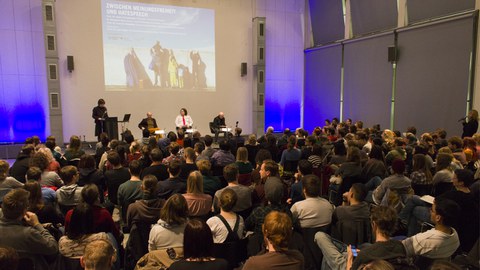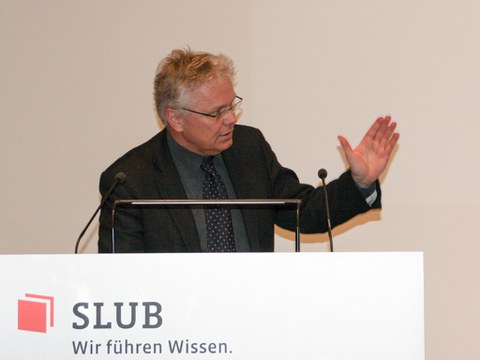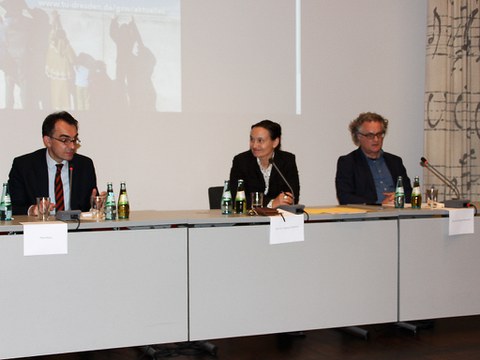Looking Back at the Discussion Series "Between Inside and Outside"
During the winter semester of 2015/16, scholars from the universities of Dresden, Wroclaw, and Trento discussed flight and migration as a European challenge in four meetings. The discussion series took place in collaboration with the SLUB Dresden and the Deutsches Hygiene Museum Dresden. This series was organized by the Office of International Affairs of the School of Humanities and Social Sciences.
Opening of the Discussion Series “Between Inside and Outside. Flight and Migration as a European Challenge”
"In our view, the task of scholarship is not to stay in the ivory tower, but to face up-to-date debates." - With these words, Prof. Matthias Klinghardt, spokesperson of the School, clarified the intention of the discussion series in his welcoming speech. On four evenings of the winter semester, scholars from the humanities and social sciences along with international guests, among them scholars from the partner universities of Wrocław and Trento, were to discuss a topic that is currently occupying Europe like no other: flight and migration.
The opening evening on 9. November 2015 was jointly held by Professor Karlheinz Ruhstorfer, professor of systematic technology at the TU Dresden, and Piotr Buras, former Berlin correspondent of “Gazeta Wyborcza” and the current director of the Warsaw Office of the European Council on Foreign Relations. The discussion was moderated by Professor Dagmar Ellerbrock, professor for Modern and Contemporary History at the Technische Universität Dresden. Two vital questions were at the heart of the discussion: What are the moral obligations Europe has to admit refugees resulting from the values of enlightenment and the general human rights? And to what extent do the EU member states reach the limits of what is logistically viable?
From the outset of the discussion Piotr Buras made it clear that there was no easy way out of this dilemma: "A walling-off of Europe is simply not feasible, even if one wanted to do so. In addition, it will have a high price: If we were to shut ourselves off, we will have to deal with sinking refugee boats more often." The liberal face of European societies is in danger because appropriate security measures to the outside can not be made without loss of liberties inside. At the same time, values such as human rights could not replace political action. Politics is forced to balance between competing values, such as freedom on the one hand and protection and security on the other, while also making painful decisions.
Besides any political necessity to compromise, Karlheinz Ruhstorfer pointed out that, in addition to economic considerations, people also came to Germany because of the fact that there is a functioning commonwealth and a political elite that makes politics with a certain ethos. "If this is lost and the pragmatics increase, the community collapses. The beacons of freedom and promise must be preserved as the foundations of European societies. And these promises must also be achievable for the newcomers. Also in Islam there are many representatives who work towards these same values."
"The admission of refugees," says Piotr Buras, "is a task for all of society." Buras's fears are that Poland, as a very individualistic society, could have its difficulties with this, especially since there are hardly any refugees present and there exists only little experience with strangers. Furthermore, The self-image of being a Catholic nation is also questioned by the arrival of Muslim refugees. However, the discussion about these facts "has already changed the Polish society even before the first refugee has arrived“.
As a possible solution to the crisis, Buras advocated for a planned resettlement policy of refugees from the camps in the Middle East to Europe: "Illegal migration is the problem. It leads to a slippery slope into crime." Karlheinz Ruhstorfer also stressed the need to support states such as Lebanon and Turkey, which had received the majority of the refugees. In addition, the causes of flight had to be combated and the "innocence" of arms trafficking should be questioned: "Anyone who has hitherto stood idly by and is now surprised, confounds symptom and cause."
Between History and the Present
“A look at the long history of migration in Europe can help to relativize the heated discussion surrounding immigrants.” – said Professor Roswitha Böhm, professor of French Literature and Cultural Studies at the TU Dresden during the second series of “Between Inside and Outside. Flight and Migration as a European Challenge.” In the panel entitled “Between History and the Present” four literary and cultural studies scholars of Polish, French, Italian, and German shared their perspectives on migration in and out of Europe on Monday 14 December 2015. This approach highlighted differences, as well as many similarities.
Alongside Professor Böhm, those invited were Dr. Dorota Kolodziejczyk from the University of Wroclaw, Dr. Cecile Kovacshazy from the University of Limoges, and Professor Elisabeth Tiller, professor for Italian literary and cultural studies at the TU Dresden. The panel which had been organized by the International Office at the School of Humanities and Social Sciences, was moderated by Professor Christian Prunitsch, professor for Polish literary and cultural studies at the TU Dresden.
All speakers emphasized the long history of migratory movements in the respective countries. "France has existed for 1000 years, and there has always been migration," said Cécile Kovacshazy. "Charles Aznavour, Serge Gainsbourg, Marie Curie, Zinédine Zidane - these 'typical' French people are all migrants!" For Italy and Germany, who have only moved from classical emigration to immigration countries in the last 50 years, were similar examples. Poland stands out from this series, but emigration still dominates despite rising immigration numbers, especially from Ukraine. Whether in the form of a Polish plumber, a media fright, especially in French media after Polish EU accession in 2004, or as a qualified IT migrant worker whom the Polish governments tried to establish an antithesis. But most of all through the image of the political emigrant, migration remains an integral part of Polish culture.
Yet even if these countries are affected differently, the current debates about rising refugee numbers are eerily similar. The negative attitude of the new Polish government party Law and Justice, which Dorota Kołodziejczyk demonstrated drastically through direct quotes, differs only slightly in content and rhetoric from positions of the French Front National, which over the past 25 years has led to a "LePenization" of the French political landscape, as Cécile Kovacshazy explained. In Italy, which, according to Elisabeth Tiller, has been confronted with rising refugee numbers since 2011, the Lega Nord has created a party stance against migrants as well. And as was pointed out by Roswitha Böhm, in Germany the numerous welcome initiatives are facing massively increasing attacks on refugees and their accommodations.
In view of the explosiveness of these debates, little time remained for a glance at the literary processing of migration and flight. In November 2016, however, interested parties were given an extensive opportunity: under the aegis of the chaors for Italian and French literary and cultural studies, a conference on migration and medialization was held, once again in co-operation with the strategic partner universities of the school humanities and social sciences, Wrocław and Trento.
Between Freedom of Speech and Hate speech
The growing number of people who are seeking protection in Europe has also led to a wave of public expressions of indignation and hateful commentaries - especially on the Internet. Many newspapers have turned off their comments section on the Internet, hate comments on social networks are supposed to be erased faster. But is it true that hate speech has increased in the course of the refugee debate and the emergence of new media? What role does hate speech play in political discourse and how does one deal with it effectively? Prof. Adam Chmielewski (philosopher, Wrocław) and Prof. Joachim Scharloth (linguist, Dresden) discussed these questions in front of a full house. The event was moderated by Prof. Lutz Hagen (communication studies scholar, Dresden).
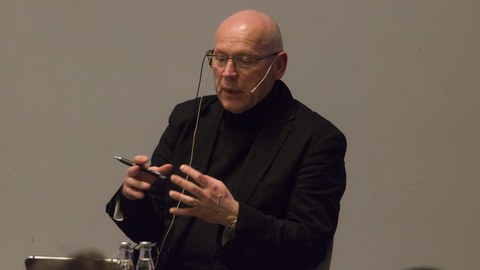
Adam Chmielewski
At the beginning of the discussion, Adam Chmielewski tried to outline what was meant by hate speech, a fairly new concept within the European debate: "I understand hate speech as an offense that aims at a fundamental part of our identity. It is an expression of intolerance, undermines our social status, excludes people from society." Joachim Scharloth agreed with this definition, but emphasized that a definition of hate speech must be clear and as narrow as possible. “The term has become a new buzzword within German media. Yet not every offense is equal to hate speech. But the term is newly defining the object it's refering to, possibly also with consequences for legal concepts such as incitement to the people or libel. That's why we need a clear concept that differs from mere libel." Scharloth viewed the increasing power of platform operators like Facebook critically. "One can observe that the state is increasingly taking actions against to hate speech and libel. But what does it mean if Facebook starts blocking users and deleting certain postings without any legal basis? Where do we shift the criteria for what can be said?”
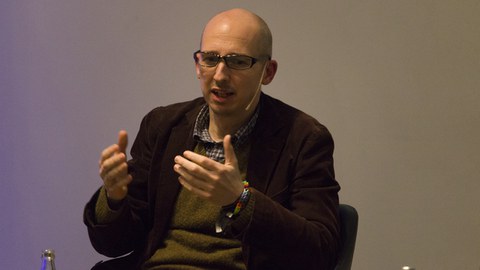
Joachim Scharloth
Furthermore, hate speech was not a new phenomenon, and it was already used in flyers distributed during the Reformation. The impression that such insults had increased with the advent of social media is due to the fact that such voices had previously not been heard: "That was said as a barroom cliché." Moreover, according to Scharloth's provocative thesis, hate speech may also be functional. This shows in his research of the 1968 movement: "Hate speech and insults were also as an act of emancipation, as a means to question the establishment. This has quite a potential for social change and therefore cannot be as quickly and clearly to condemned." Adam Chmielewski saw this thesis a little more critically. Hate speech has been instrumentalized in Polish politics - particularly successfully by the chairman of the current government, Jarosław Kaczyński: "But the question is: do we really want a society that is tolerant of hate speech?" Kaczyński's disparaging statements about refugees gave a voice to sentiments which were previously taboo. "By this he [Kaczyński] signals to people: You can express such statements in public. This has led to a massive wave of hate speech." The biggest problem, however, is not the polarization of societies, but their total inability to find a commmon ground to dicsuss problems. "The old Habermasian ideal that everyone is accepted into a discussion and is allowed to exchange arguments is permanently undermined by the fact that people and positions are not listened to, but are questioned in principle."
Joachim Scharloth clearly rejected a question from the audience, whether there might be not enough safe spaces in which to voice a critical position on refugees without being placed in the right-wing corner: "I believe this belongs to an open society, that someone who takes up a certain stance can be criticized by others for it. Anyone who thinks this, has wrong ideas about how public discourse works."
